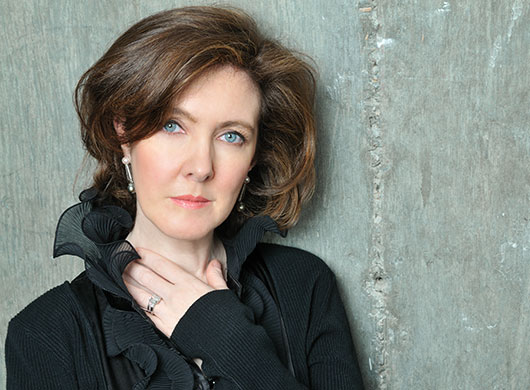New World members close chamber season with Central European rarities

Pianist Anne-Marie McDermott performed Bartók’s Piano Quintet with New World Symphony musicians Sunday in Miami Beach.
Surprises abounded at the New World Symphony’s final chamber music concert of the season Sunday afternoon at the New World Center. The music of Bela Bartók sounded far more conservative than that of his Hungarian compatriot Zoltán Kodály and a mini-piano concerto by the usually solemn Leos Janácek emerged downright cheeky. These Central European rarities from the margins of the chamber repertoire offered a fine demonstration of the gifted players’ skill and musicality.
The featured score was the Piano Quintet in C Major by the 23-year-old Bartók. Those who know Bartók only through the angularity of his piano concertos need to hear this early work which the composer later attempted to suppress. Spanning four movements and 42 minutes, the scale, structure and melodic richness of the score suggest that Johannes Brahms in Hungary circa 1904. Unabashedly romantic and often sentimental, the music abounds in appealing thematic invention that seems to come out of a 19th-century musical playbook. Although there are moments (especially in the first movement) when the rhetoric threatens to turn diffuse and run off the rails, this is a splendid score that deserves to be heard more often.
The pivotal keyboard part is a virtuosic labyrinth of knuckle-busting salvos and wild changes of meter and pulse. In the firm hands of Anne-Marie McDermott, the technical challenges were thrown off with aplomb and showmanship. The usually hard tone of the house Yamaha emerged liquid and soft under McDermott’s touch in the Adagio, a darkly tinted night music that suggests the Bartók to come. A longtime member of the Chamber Music Society of Lincoln Center, McDermott is a superb collaborative pianist who clearly inspired the four string players. In the initial Allegro, one could hear the effort the musicians were making but they quickly found their footing and gave an assured, smoothly coordinated reading of this daunting score.
Violist Yuan Qi produced a big sonority from her instrument and nobility of phrasing in solo moments. The supple interplay of McDermott’s piano and strings brought out the spirit and verve beneath the notes of the Vivace Scherzando. Violinist Alex Gonzalez’s sliding portamento aptly conjured up images of a cafe gypsy fiddler. Minute and subtle dynamic contrasts suggested the drama and emotional despair that underlines the czardas theme of the slow movement. The strings’ wide vibrato and sudden fortissimos emphatically drove home the disturbing subtext surrounding the outwardly sweet principal motif.
With McDermott setting a swift pace for the Magyar dances of the finale, cellist Ian Greenberg and violinist Sodam Lim brought idiomatic feeling to the moments of calm before the blast of rhythmic propulsion in the race to the finish. The audience’s cheers and standing ovation attested to the score’s potent immediacy, especially when played with such brilliance.
If the program’s first half was less high-powered, it still brought some diverting aperitifs before the main event.
The unmoored harmonies in the opening pages of Kodály’s String Quartet No. 2 may have come as a shock to listeners who are only familiar with the composer’s folksy Dances of Galanta and Peacock Variations. Jagged phrases and divergent lines between the instruments run through the opening Allegro, proclaiming his early modernist path in no small manner. The concluding Allegro giocoso was thrown off with abandon by violinists Kevin Chen and Ethan Hoppe, violist Kip Riecken and cellist Chava Appiah. Chen’s soaring solo interludes provided contrast from the score’s dissonance.
The flights of fancy in Janácek’s Concertino (a piano concerto in everything but name) suggest the composer’s reminiscences from his childhood of animals playing and fighting. This late work is perky and irreverent, light years removed from the violence of Janácek’s Piano Sonata or the austere textures of his keyboard miniatures, much less the turmoil of his operas.
The sweep and finesse of John Wilson’s pianism was the binding element in a score that mixes the spare three-note horn motif in the opening section and the quiet birdsong of the Con moto. Scott Leger’s horn intonation was spot-on in the opening dialogue, and Giovanni Bertoni’s high-flying clarinet riffs had one foot in Bohemia and the other in klezmer. With Hoppe, Chen and Riecken holding up the string parts and Justin Cummings on bassoon, the concluding Allegro was a lightning fast workout for all seven players.
Dvorák’s Silent Woods was the afternoon’s lyrical intermezzo. Despite a ringing cell phone during the opening bars, cellist Alan Ohkubo and pianist Thomas Steigerwald gave a poised account of this miniature gem. Ohkubo’s warmth of tone and sophisticated musicianship avoided the pitfall of allowing sentiment to turn into bathos.
Michael Tilson Thomas conducts the New World Symphony in his new edition of Mahler’s arrangement of Schubert’s Quartet No. 14 (“Death and the Maiden”) as well as his Four Playthings of the Wind with soprano Measha Brueggergosman and jazz vocalists Kristin Toedtman and Kara Dugan. Pianist John Wilson plays Tilson Thomas’ Sunset Soliloquy and You Come Here Often? Concert time is 2 p.m. Saturday at the New World Center in Miami Beach. nws.edu; 305-673-3331
Posted in Performances
Leave a Comment
Mon Apr 15, 2019
at 12:33 pm
No Comments






